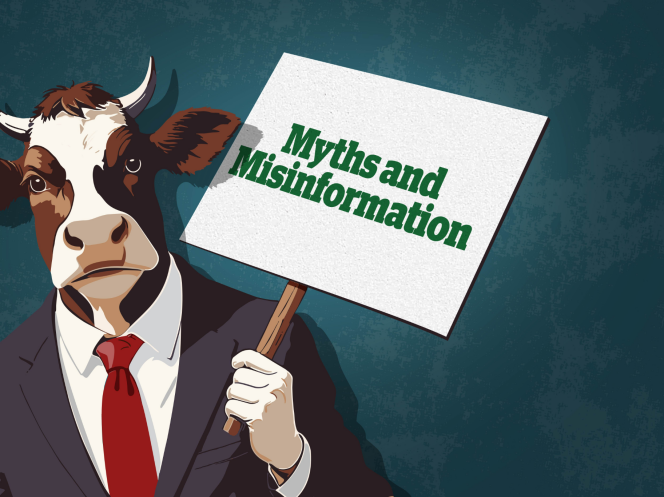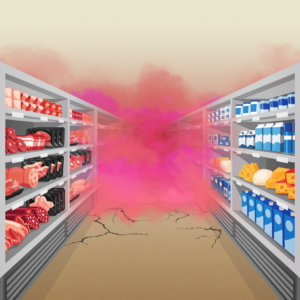Big Meat and Dairy’s Narratives To Derail Climate Action

Like many planet- and people-harming industries, Big Meat and Dairy companies are using an array of tactics to protect their businesses in the face of growing scrutiny over their climate impact. One key tactic involves deploying ‘narratives’ in advertising, PR campaigns, and lobbying that paint the industry as greener than it really is and frame the stakes as too high to change.
These narratives are dangerous. They have enabled the industry to distract, delay and derail policies that curb the sector’s climate impact. They have even infiltrated global institutions that develop guidance on food system transformation, including the United Nations’ Food and Agriculture Organization.
The science is clear: we cannot stay close to a 1.5°C temperature increase trajectory, as stipulated by the Paris Agreement, if we do not significantly cut methane emissions and reduce consumption of animal products – yet both are projected to increase. The agricultural sector is uniquely dependent on a stable climate system and one of the biggest contributors to climate change, directly (through methane and nitrous oxide pollution from animals) and indirectly (as one of the major drivers of deforestation and land-use change). Transformative changes are both needed and possible in agriculture, particularly in reducing methane emissions from livestock.
This briefing identifies, dissects and fact-checks some of the most common narratives used by Big Meat and Dairy to justify the continuation and expansion of its business model. We also explore how these narratives shape discussions about global meat and dairy production and consumption and the urgent need to transition to healthier and more sustainable diets.
The Big Meat and Dairy industry often weaves different narratives together in its marketing, lobbying and sustainability reports, with its arguments usually falling under one or more of the following umbrellas:
- Food security: Policies to support more sustainable farming, particularly proposals to reduce meat and dairy production/consumption, would jeopardise food security.
- Growing demand: Continued meat and dairy consumption levels are ‘essential’ for healthy diets.
- Emissions leakage: Action on emissions will result in production moving to ‘less efficient’ countries.
- Putting family farms out of business: Any environmental regulation will hurt family farms and rural communities.
- The ‘green deception’: The industry’s environmental impacts can be fixed by embracing select regenerative farming practices, so there’s no need to reduce livestock numbers.
The Changing Markets Foundation extensively documented these and other industry tactics in a July 2024 report, The New Merchants of Doubt: How Big Meat and Dairy Avoid Climate Action.
Uncover the deceptive narratives that Big Meat and Dairy use to derail climate action. Get the full report now and learn how their tactics undermine efforts to address the climate crisis.
You might also like...

“Clean Up on Aisle 3”: The methane mess supermarkets are hiding
New analysis finds twenty of the world's biggest food retailers fail to get to grips with massive methane emissions in their supply chains, despite meat and dairy making up an estimated one third of their to...

Truth, Lies and Culture Wars – Social listening analysis of meat and dairy persuasion narratives
This study is a deep dive into information and misinformation on social media around production and consumption of animal products.

Growing the Good: The Case For Low-Carbon Transition in the Food Sector
This report looked at the climate, environmental and health impacts of overconsumption of meat and animal products, current market trends and public policies in this area.